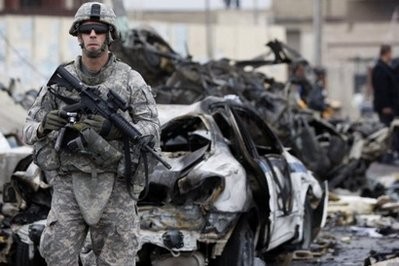Seven years after Michael Moore was booed off the Oscars stage for protesting the invasion of Iraq, a film depicting the conflict is poised to take the top prize at the Academy Awards.
With less than a week to go until the Oscars are handed out at the Kodak Theater, Kathryn Bigelow's gritty "The Hurt Locker" is the overwhelming favorite to be crowned best picture.
If successful, it will represent a significant breakthrough for feature films about the conflicts in Iraq and Afghanistan, which until "The Hurt Locker" had been viewed as commercial and critical poison.

A slew of dramas about the war have been released in recent years, from Robert Redford's earnest 2007 "Lions for Lambs" to Brian De Palma's "Redacted," but almost without exception flopped at the box office or were heavily panned.
Yet the critical and awards season success of the low-budget "Hurt Locker" has forced analysts to revise the conventional wisdom that any movie that attempted to depict an unpopular conflict was destined for failure. Related article: Newcomers light up Oscars red carpet
"The film tends to put a magnifying lens on a very very difficult situation," Bigelow told journalists in Beverly Hills recently.
"And with the conflicts in Iraq and Afghanistan the film continues to be more and more timely. The film has offered a glimpse into a conflict which has otherwise been very abstract. I think it has touched a nerve."
Tom O'Neil, an awards season pundit with the Los Angeles Times, believes "The Hurt Locker" has succeeded where others failed because Bigelow shied away from making any kind of political statement about the war in Iraq.
"The Hurt Locker' is getting this kind of reception because it doesn't force viewers to make a political judgement about the Iraq War," O'Neil said. "It simply dramatizes the experience -- the frenzy, the terror, the danger of it."
While "The Hurt Locker" has attracted criticism from some veterans groups for its depiction of a bomb disposal unit -- several have described it as unrealistic, John Wayne-style hokum -- others have applauded it.
"It's a movie, not a training film," Jim O'Neil, the executive director of the Explosive Ordnance Disposal Memorial Foundation told AFP.
"I appreciate the film for the story it told, and I appreciate the film for the exposure it brings to the EOD profession. People didn't know EOD existed or that there was a specific branch of the military dedicated to this area."
Bigelow said she wanted the audience to get a "boots-on-the-ground look at what it would be like to have the world's most dangerous job."
"It's just an incredibly, harrowing, dangerous, volatile environment," Bigelow has said.
"These are men and women who volunteer who are there by choice who are walking toward what you and I and perhaps the rest of the world would run from.
"They arguably have the most dangerous job in the world. And yet they're there by choice."
The Oscar-nominated star of "The Hurt Locker," Jeremy Renner, said the movie gave him increased awareness of the work of US servicemen and women.
"My views have changed as far as respect for the military," Renner told AFP.
"I think knowing a lot about warfare. Doing the same training that they all go through and being there. It's an experience that I will never forget," added Renner, who plays the renegade Staff Sgt William James.
"The Hurt Locker" is not the only Iraq film vying for honors at the Oscars. Woody Harrelson is nominated in the best supporting actor category for his performance in "The Messenger," a low-budget independent film about the work of an army officer whose job is informing next of kin about a bereavement.
A vocal anti-war activist, Harrelson said work on "The Messenger" helped change his attitudes towards the military.
"The former administration of this country would have us associate the warriors with the war. So that when they say 'Support the troops' what they're really saying is 'Support Our War,'" Harrelson says.
"So I always kind of lumped it altogether. It wasn't until I had the opportunity during the shooting of 'The Messenger' to spend a lot of time with people in the army that I started to realize how amazing these people are.
"I was knocked out. But much as I have come to love the warrior I still loathe the war."
























